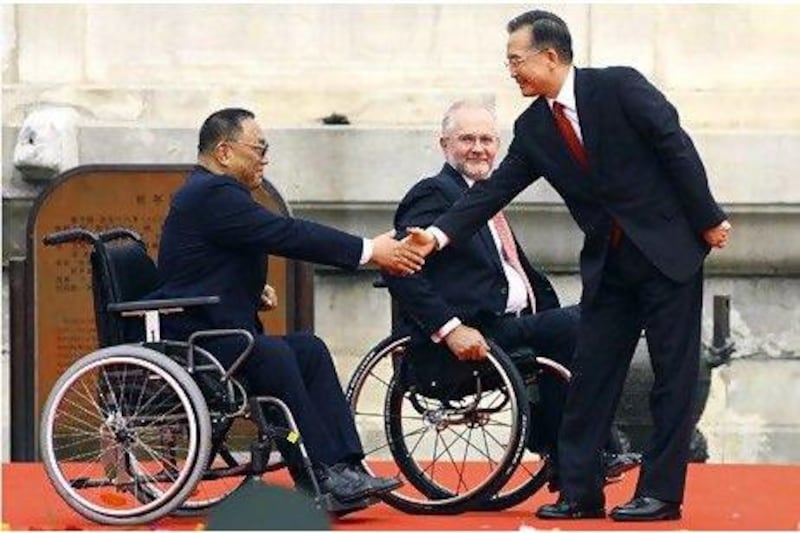BEIJING // For millennia in China, ambitious scholars would covet a place as a mandarin in the imperial administration.
Today, the sons and daughters of these top government officials are securing the most senior positions in industry and finance. Their goal is different: becoming rich.
In the latest such appointment, Wen Yunsong, son of the premier, Wen Jiabao, has become chairman of China Satellite Communications Company, a state-owned enterprise that aims to become the largest Asian company in its field by 2015. The company's share price rose 50 per cent after the announcement.
"The parents are doing politics and the children are doing business. For a lot of people who went into politics in the early years, they have political capital and social capital and their children are able to take advantage of that," said Bo Zhiyue, author of the book China's Elite Politics.
"These so-called princelings, they're no longer interested in politics and they just want to make money. Some study abroad. They study business or finance at American or European universities. They come back for business," said Mr Bo, who also is research fellow at the National University of Singapore's East Asian Institute.
Their activities get little coverage in the state-run media and are often blocked in internet searches, but the children of leaders from the past two decades have unrivalled contacts and influence, known as "guanxi" in Chinese.
The son of Wen Jiabao's immediate predecessor, Zhu Rongji, heads China International Capital Corporation, while the daughter of Mr Zhu's predecessor, Li Peng, is chairwoman of China Power International Development.
The Chinese president Hu Jintao's son, Hu Haifeng, was chairman of a company that produced X-ray and radioactivity monitoring equipment. The company was involved in a corruption scandal in Namibia and many internet pages linked to the younger Mr Hu are blocked.
A good family name can even help achieve prominence in the not-for-profit sector. The former leader Deng Xiaoping's son, Deng Pufang, a paraplegic after he fell from a building during the Cultural Revolution, is the founder and chairman of the China Disabled Persons' Federation.
In contrast to those achieving success in business, the older sons of China's revolutionary leaders focused on politics and are now reaching the top.
For example, the vice president Xi Jinping, whose father was a deputy premier, is expected to take over as Communist Party leader later this year in what could be seen as a faint echo of the traditions of imperial succession.
That those a generation younger have different interests says something about how commerce and politics are viewed, relative to each other, in modern China, experts say.
"The actual party leaders are not necessarily held to be people who are very educated, very cultured, very cosmopolitan," said Barry Sautman, a Chinese political analyst at Hong Kong University of Science and Technology.
"Business people, particularly those involved in transnational business, they have a high profile. They are obviously very wealthy. They travel the world. They have an interesting life. That's considered to be a more desirable profession."
It is not unique to China. In Malaysia, Mukhriz Mahathir, son of the former prime minister Mahathir Mohamad, held several senior business positions, although he has since turned to politics as a deputy minister
The prominence in business of the sons and daughters of Chinese leaders has resulted in angry comments from netizens, although it is not a subject the public or experts within China would tend to comment upon openly. Last year, for example, a netizen called "Nowadays, you are special if you have a special dad."
While the public might have a grudging respect for a public servant whose father was a communist revolutionary, "someone who's become rich making use of their family connections is particularly resented," Mr Sautman said.
It also brings into focus concerns that China's leaders may be unwilling to tackle vested interests in state-run enterprises keen to be protected from the threats a true market economy would pose.
While resentment over such webs of power and influence could grow and threaten continued Communist Party rule, the entrenched networks of guanxi could easily remain in place for a long time.
"In China, the process is opaque. It's not clear. In the long run, it could be a high risk if the political elites and the business elites are so tightly knit and there's no hope for other people to get into the system, that system will be too rigid," said Mr Bo.
"But to the extent that there's mobility between different stratas of China's society that system can be sustained for a long time."
China's top leaders are examples of mobility. The current president, Hu Jintao, rose up the ranks from the Communist Youth League and his father ran a tea shop.
"As long as people have hope to get into the political elite and business elite," Mr Bo said, "they may be a bit more tolerant."






